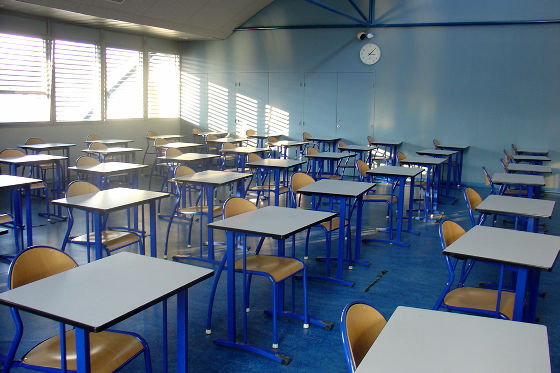Can AI fix education? We asked Bill Gates

by
While technological advances have dramatically changed the way students communicate and live their lives, schools still rely on a teacher speaking to 30 students. Bill Gates has suggested that online classes could revolutionize education , and the Bill & Melinda Gates Foundation has invested more than $240 million (approximately 27 billion yen) in a field called personalized learning. Regarding personalized learning, Gates said, 'We're in the early stages, and it's unclear at this point whether personalized learning will take hold in the next five to 10 years.' In an interview with The Verge , an IT news site, he discussed how education is likely to change in the future and how artificial intelligence will play a role in the education field.
Can AI fix education? We asked Bill Gates | The Verge
http://www.theverge.com/2016/4/25/11492102/bill-gates-interview-education-software-artificial-intelligence
interviewer:
What are schools that offer personalized learning doing for their students, and what opportunities are they creating?
Bill Gates (hereinafter Gates):
There is no strict definition of personalized learning. However, in general, people learn at different rates. If there are students in the class who excel at understanding, it's a problem because they will get bored. On the other hand, students who are behind in class will feel like they're not good at it. This is especially true in math, where if they don't understand what the teacher is saying, they will give up on the subject and never return to it.

by
interviewer:
You've looked at community colleges' efforts to provide remedial education for students who have fallen behind in their studies. You've said that institutions that use personalized learning in remedial education end up doubling their completion rates. Why is that?
Gates:
There's a big line between high school and university. To get into university, students need a certain score in math and Japanese, but those who don't meet the required standards are forced to take remedial classes. Existing remedial classes assign students to subjects in a binary way: 'OK, you don't need this' or 'you should take this.' However, even within the same subject, students' strengths and weaknesses vary depending on the content they're studying. Individualized learning allows students to master specific areas, allowing them to relearn only the parts they don't understand and return to regular classes without spending a year in remedial classes. Individualized learning also allows students to constantly assess their current level in the material they're studying, identifying remaining tasks and the level they need to reach.
Look around the classroom and you'll see students excelling in one topic and struggling with another. In a classroom of 30 students with one teacher, it's clear there's a lot of boredom.
interviewer:
How do you get schools and teachers to embrace personalized learning? What obstacles do you see in the way of this field maturing?
Gates:
The biggest barrier was the gap between children who use digital devices at home outside of school and those who don't. However, with the widespread use of PCs and tablets, it's now possible to conduct individual learning on a smartphone screen. Whether an activity is better done on a small screen or a large screen depends on the type of activity, but in any case, most American children now have smartphones, so it can be said that the biggest barrier has disappeared.

by Intel Free Press
interviewer:
I get the impression that the role of the teacher will change in individualized learning. I imagine there will be resistance from teachers, so how do you convince them?
Gates:
Although the tedious work of creating math homework at home and grading tests will be reduced, the primary role of a teacher - to 'help individual students learn' - will remain unchanged, so I believe there will be no major change in the skills required. There will probably be a generation that cannot accept new teaching methods, but younger teachers will undoubtedly participate. For K-12 teachers (from kindergarten to high school), the work that will be eliminated by individual learning is probably not something they consider important.
The changes are even more dramatic in higher education. Lessons could be filled with online videos. Whether or not educational institutions should actually do this is unclear, but it's a bit threatening. It's a big change that cuts out a lot, but it's possible given the financial pressures many schools are under right now. And some of the courses offered by corporations are of higher quality than the average classroom.
interviewer:
There has been a lot of interest in artificial intelligence in the tech world recently, with Microsoft focusing on developing bots. What do you think the role of artificial intelligence in education is?
Gates:
That is writing. Some people ridicule it, but there are currently efforts to use AI to provide feedback on what people write, and I believe this will be possible in the next few years. Looking at a piece of writing and providing feedback that helps the writer improve requires careful reading and cannot be mechanical. For this reason, one of the pinnacles that AI in the field of education should reach is a private tutor who realizes the 'richness of overall dialogue.'
I like discussing new topics, and if I say something stupid, someone emails me and I can correct my thinking. But what if things are more complicated than I thought, or I've missed something, and there's no one to correct me? By talking to a virtual tutor, I can recognize misunderstandings and arbitrary thinking, and learn the correct way to use words. This technology, which will become available in the coming decades, will help us. Even now, it is possible to hire a tutor in subjects like mathematics for a fee, but the important thing is that it will be free.

Related Posts:







